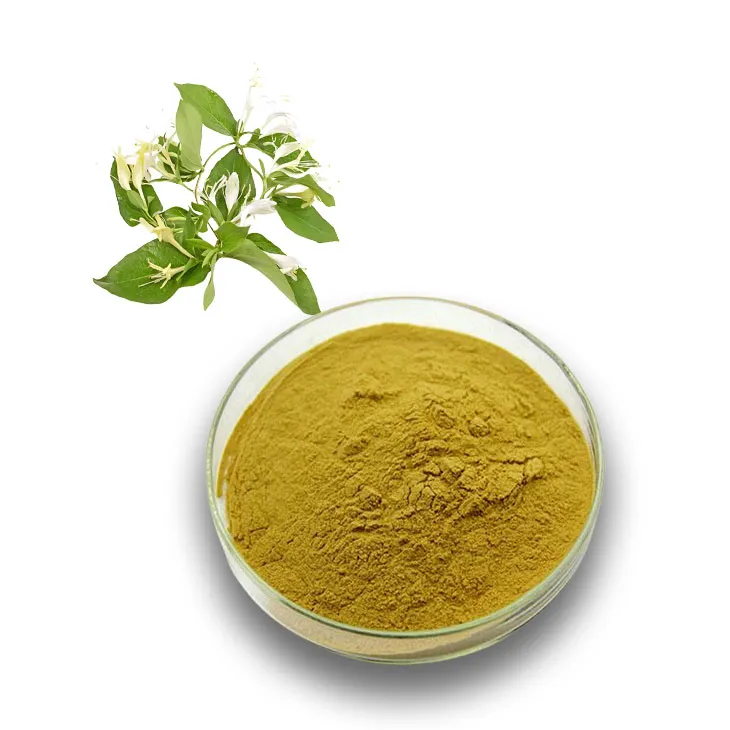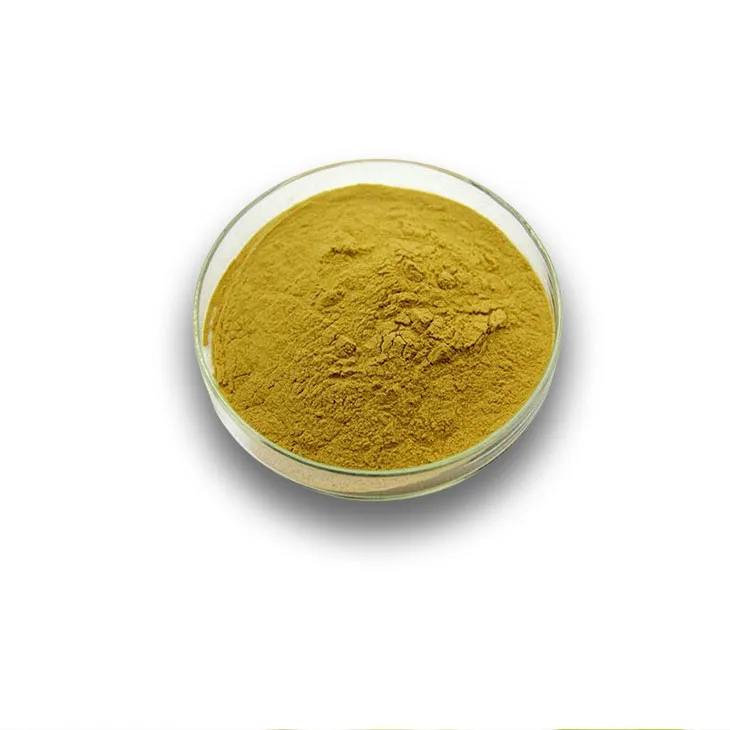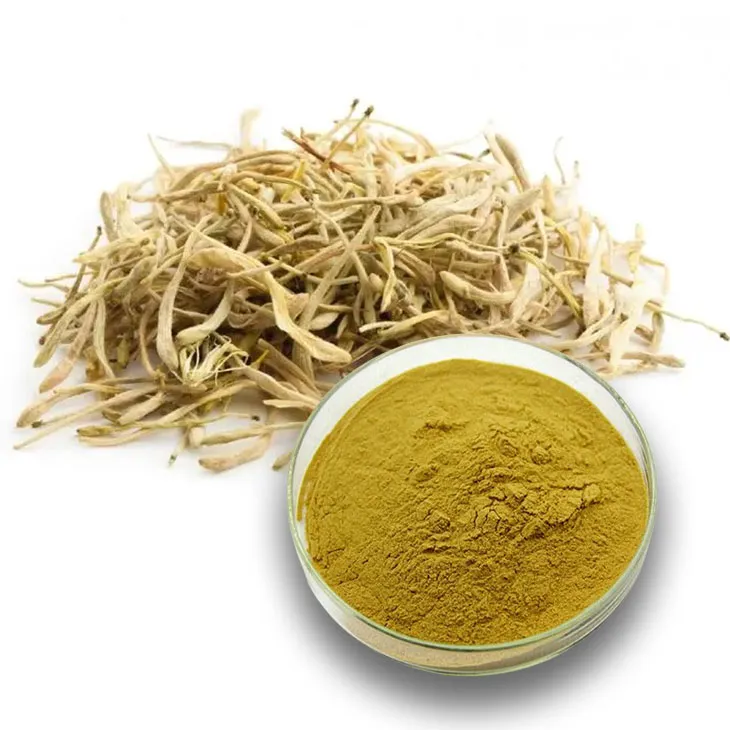- 0086-571-85302990
- sales@greenskybio.com
The best organic honeysuckle pollen.
2024-12-02

1. Introduction to Honeysuckle
Honeysuckle is a plant that has been recognized for centuries for its multiple benefits. It is often found in various regions around the world, and its alluring fragrance and beautiful appearance have made it a popular plant in gardens as well as in traditional medicine. The honeysuckle plant belongs to the Caprifoliaceae family, and it is known for its twining vines and tubular flowers. These flowers are not only aesthetically pleasing but also play a significant role in the production of Honeysuckle Pollen.

2. The Significance of Organic
Organic products have become increasingly popular in recent years, and for good reason. When it comes to Honeysuckle Pollen, the organic label indicates that the pollen has been sourced from plants that are grown without the use of synthetic pesticides, fertilizers, or genetically modified organisms (GMOs). This is of utmost importance as it ensures that the final product is free from harmful chemical residues that could potentially have adverse effects on human health.
Organic farming practices also tend to be more sustainable. They promote soil health, biodiversity, and the overall well - being of the ecosystem. For example, organic farmers often use natural methods such as crop rotation and composting to enrich the soil, which in turn provides a more favorable environment for honeysuckle plants to grow and thrive. This ultimately results in a higher - quality Honeysuckle Pollen.

3. Nutritional Composition of Honeysuckle Pollen
The best organic honeysuckle pollen is a nutritional powerhouse. It contains a rich array of nutrients that are essential for human health.
3.1 Proteins
Proteins are one of the key components of honeysuckle pollen. Proteins are made up of amino acids, which are the building blocks of the body. They play crucial roles in various physiological processes such as muscle building, repair of tissues, and the production of enzymes and hormones. Honeysuckle pollen provides a good source of plant - based proteins, which can be an excellent addition to the diet, especially for vegetarians and vegans.
3.2 Vitamins
Honeysuckle pollen is also rich in vitamins. It contains vitamins such as vitamin C, which is well - known for its antioxidant properties. Vitamin C helps to boost the immune system, promotes collagen synthesis for healthy skin, and aids in the absorption of iron. Additionally, honeysuckle pollen may also contain other vitamins like vitamin B - complex, which are involved in energy metabolism and the proper functioning of the nervous system.
3.3 Minerals
Minerals are another important part of the nutritional profile of honeysuckle pollen. It may contain minerals like potassium, which is essential for maintaining proper heart function and regulating blood pressure. Calcium, which is crucial for strong bones and teeth, may also be present in honeysuckle pollen. Other minerals such as magnesium, zinc, and iron could also be found, each playing their own unique roles in the body's physiological functions.

4. Antioxidant Effects
One of the most remarkable properties of the best organic honeysuckle pollen is its antioxidant effects. Antioxidants are substances that can neutralize free radicals in the body. Free radicals are unstable molecules that are produced as a result of normal cellular metabolism, but they can also be generated by external factors such as pollution, radiation, and smoking.
When free radicals accumulate in the body, they can cause oxidative stress. Oxidative stress has been linked to a variety of health problems, including premature aging, heart disease, cancer, and neurodegenerative disorders. The antioxidants present in honeysuckle pollen, such as vitamin C and other bioactive compounds, can donate electrons to free radicals, thereby stabilizing them and preventing them from causing damage to cells and tissues.
This antioxidant activity not only helps to maintain the health of cells but also has implications for overall longevity. By reducing oxidative stress, honeysuckle pollen can contribute to a healthier and more youthful appearance, as it helps to slow down the aging process at the cellular level.

5. Anti - Inflammatory Properties
In addition to its antioxidant effects, the best organic honeysuckle pollen may also possess anti - inflammatory properties. Inflammation is a natural response of the body's immune system to injury or infection. However, chronic inflammation can be a problem and has been associated with numerous diseases, such as arthritis, inflammatory bowel disease, and cardiovascular disease.
The anti - inflammatory properties of honeysuckle pollen may be due to the presence of certain bioactive compounds. These compounds can modulate the body's inflammatory response by interfering with the signaling pathways involved in inflammation. For example, they may inhibit the production of pro - inflammatory cytokines, which are molecules that promote inflammation.
This makes honeysuckle pollen potentially beneficial for individuals who suffer from inflammatory conditions. It may help to reduce pain, swelling, and redness associated with inflammation, and may also contribute to the long - term management of chronic inflammatory diseases.
6. Sourcing and Processing of Organic Honeysuckle Pollen
The sourcing and processing of the best organic honeysuckle pollen are crucial steps in ensuring its quality and integrity.
6.1 Sourcing
When sourcing organic honeysuckle pollen, it is essential to select plants that are grown in an organic environment. This means that the honeysuckle plants should be grown in areas free from chemical pollutants and GMOs. Organic farms that follow strict regulations and certifications are the ideal sources for high - quality honeysuckle pollen.
Additionally, the location of the honeysuckle plants can also affect the quality of the pollen. Honeysuckle plants that grow in clean, unpolluted areas with good air and soil quality are more likely to produce high - quality pollen. For example, plants growing in mountainous regions with fresh air and natural water sources may yield pollen with a more pure and potent composition.
6.2 Processing
Once the honeysuckle pollen is sourced, the processing methods used are also important. The processing should be carried out in a way that preserves the natural properties of the pollen. This may involve gentle drying techniques to remove moisture while maintaining the integrity of the nutrients and bioactive compounds.
Modern processing techniques also aim to ensure that the pollen is free from contaminants such as dust, dirt, and other impurities. Quality control measures are implemented at every stage of the processing to ensure that the final product is of the highest quality. This includes testing for purity, nutritional content, and the absence of harmful substances.
7. Incorporating Organic Honeysuckle Pollen into Your Diet
There are several ways to incorporate the best organic honeysuckle pollen into your diet.
- Smoothies: One of the easiest ways is to add a teaspoon or two of honeysuckle pollen to your morning smoothie. You can combine it with fruits such as bananas, berries, and mangoes, along with some yogurt or plant - based milk for a delicious and nutritious start to your day.
- Salads: Sprinkle a small amount of honeysuckle pollen on top of your salads. It can add a unique flavor and a nutritional boost to your greens, vegetables, and fruits.
- Baked Goods: If you like baking, you can incorporate honeysuckle pollen into your muffins, breads, or cookies. It can add an interesting flavor and texture to your baked treats while also providing the health benefits of the pollen.
8. Precautions and Considerations
While organic honeysuckle pollen has many potential benefits, there are also some precautions and considerations to keep in mind.
- Allergies: Some individuals may be allergic to honeysuckle pollen. If you have a history of pollen allergies, it is advisable to consult a doctor before consuming honeysuckle pollen. Symptoms of an allergic reaction may include itching, swelling, hives, or difficulty breathing.
- Dosage: As with any supplement, it is important to follow the recommended dosage. Excessive consumption of honeysuckle pollen may lead to adverse effects, although the exact safe upper limit has not been firmly established. It is best to start with a small amount and gradually increase the dosage if needed, while monitoring your body's response.
9. Conclusion
The best organic honeysuckle pollen is a truly remarkable natural product. With its rich nutritional composition, antioxidant effects, and potential anti - inflammatory properties, it offers a range of health benefits. However, it is important to ensure that it is sourced and processed organically to guarantee its purity and quality. When used correctly and with appropriate precautions, honeysuckle pollen can be a valuable addition to a healthy diet, contributing to overall well - being and potentially helping to prevent and manage certain health conditions.
FAQ:
What are the main nutrients in the best organic honeysuckle pollen?
The best organic honeysuckle pollen is rich in proteins, vitamins, and minerals.
How does organic honeysuckle pollen slow down the aging process?
It has antioxidant effects, which can help combat free radicals in the body, thus slowing down the aging process.
Is organic honeysuckle pollen beneficial for inflammatory conditions? Why?
Yes, it may be beneficial for those with inflammatory conditions because it may have certain anti - inflammatory properties.
How is the quality of the best organic honeysuckle pollen ensured?
This type of pollen is carefully sourced and processed to maintain its organic integrity, ensuring that consumers get a pure and high - quality product.
What makes organic honeysuckle pollen a remarkable natural product?
Organic honeysuckle pollen is a remarkable natural product because honeysuckle itself is well - known for its various health - promoting properties, and the pollen is rich in nutrients, has antioxidant and anti - inflammatory properties.
Related literature
- The Nutritional and Medicinal Value of Honeysuckle Pollen"
- "Organic Honeysuckle Pollen: A Treasure of Health"
- "The Role of Honeysuckle Pollen in Anti - aging and Anti - inflammation"
- ▶ Hesperidin
- ▶ Citrus Bioflavonoids
- ▶ Plant Extract
- ▶ lycopene
- ▶ Diosmin
- ▶ Grape seed extract
- ▶ Sea buckthorn Juice Powder
- ▶ Fruit Juice Powder
- ▶ Hops Extract
- ▶ Artichoke Extract
- ▶ Mushroom extract
- ▶ Astaxanthin
- ▶ Green Tea Extract
- ▶ Curcumin
- ▶ Horse Chestnut Extract
- ▶ Other Product
- ▶ Boswellia Serrata Extract
- ▶ Resveratrol
- ▶ Marigold Extract
- ▶ Grape Leaf Extract
- ▶ New Product
- ▶ Aminolevulinic acid
- ▶ Cranberry Extract
- ▶ Red Yeast Rice
- ▶ Red Wine Extract
-
Pueraria Lobata Extract
2024-12-02
-
Sea buckthorn Juice Powder
2024-12-02
-
Tinospora cordifolia extract
2024-12-02
-
Hedyotis Diffusa Extract
2024-12-02
-
Passionflower Extract
2024-12-02
-
Avocado Extract Powder
2024-12-02
-
Red Vine Extract
2024-12-02
-
Scutellaria Extract
2024-12-02
-
Beetroot juice Powder
2024-12-02
-
Shikonin
2024-12-02





















